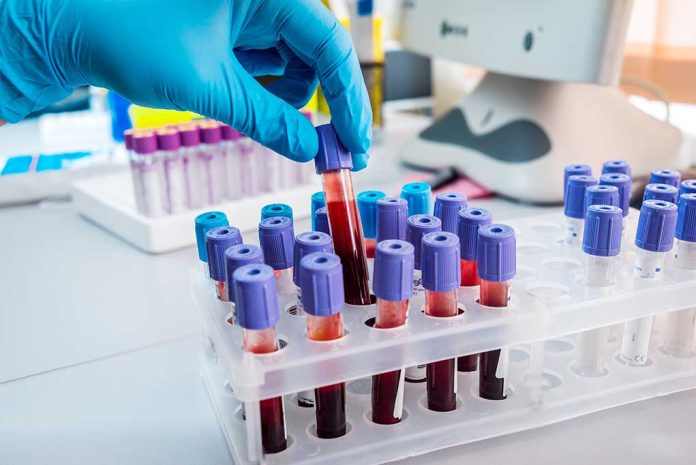
Johns Hopkins researchers have developed a rapid blood test that could revolutionize heart attack diagnosis in just minutes.
At a Glance
- New rapid blood test detects heart attack biomarkers in 5-7 minutes
- Test uses advanced biophotonics and a nanostructured chip
- Affordable design enables widespread adoption in emergency and home settings
- Technology has potential for detecting other conditions like cancers and infectious diseases
Rapid Heart Attack Detection: A Game-Changer in Diagnostics
Johns Hopkins University researchers have unveiled a groundbreaking rapid blood test that promises to transform heart attack diagnostics. This innovative test, powered by advanced biophotonics and a nanostructured chip, can detect heart attack biomarkers with remarkable accuracy in just five to seven minutes. The development marks a significant leap forward in emergency medical care and at-home health monitoring.
The new test’s speed and accuracy offer substantial benefits to both emergency responders and home users. Its affordable design facilitates widespread adoption, potentially revolutionizing how heart attacks are diagnosed and treated. Moreover, the versatile capabilities of this technology open doors to future detection of other serious conditions like cancers and infectious diseases, signaling a crucial advancement in real-time, personalized healthcare innovations.
Existing Rapid Test Technologies
While the Johns Hopkins test represents the latest breakthrough, it builds upon a foundation of rapid diagnostic technologies already making waves in the medical field. Philips, for instance, has developed the Minicare I-20, a handheld device for rapid heart attack diagnosis at the point of care. This device uses a single droplet of blood to detect proteins indicative of a heart attack, providing results in 10 minutes.
“Blood samples are usually analyzed in the hospital laboratory, which can easily take more than an hour to get the result back to the ED physician. Point-of-care testing can significantly help to reduce the turnaround time,” says Dr. Paul Collinson, consultant chemical pathologist at St. George’s University Hospitals NHS Foundation Trust in the United Kingdom.
The Minicare I-20 measures cardiac troponin I (cTnI) levels, a protein released into the blood after a heart attack, offering on-the-spot test results comparable to laboratory results. This technology can reduce the diagnostic protocol time by up to 3 hours, aiding faster patient triage and treatment.
Impact on Healthcare Costs and Patient Outcomes
Acute coronary syndromes (ACS) significantly impact healthcare budgets globally, with costs expected to rise due to increasing cardiovascular disease and aging populations. Home-based solutions for measuring cardiac biomarkers, particularly troponins, may reduce healthcare costs by enabling earlier diagnosis and improving patient outcomes.
“Minicare I-20 is designed to help care providers to reduce time to treatment and reduce time to discharge of patients, thereby helping to decrease crowding in the emergency department and leading to better use of hospital resources,” says Marcel van Kasteel, CEO of Handheld Diagnostics at Philips.
Cardiovascular diseases remain the leading cause of death worldwide, with acute myocardial infarction (AMI) being a common ACS. High-sensitive troponin assays can improve patient outcomes by reducing diagnosis time, though they face challenges like nonspecific elevations and lack of standardization.
Advancements in Hospital Settings
Hospitals are also adopting more advanced testing methods. Vanderbilt University Hospital and Monroe Carell Jr. Children’s Hospital have introduced a new high-sensitivity cardiac troponin T (hs-cTnT) test, which is more precise and faster than conventional troponin tests.
“When it comes to the evaluation of chest pain, which should always be taken very seriously, every second counts,” said Henry “Gerad” Colmer IV, MD, assistant professor of Emergency Medicine and associate medical director of VUH Clinical Operations. “This newer test is approximately three times faster to run and costs the same. And the higher sensitivity cardiac troponin tests have been shown to improve and accelerate the early management of patients presenting with suspected MI.”
The hs-cTnT test can reduce emergency room time and unnecessary hospital admissions for patients with heart attack symptoms. It allows for myocardial infarction exclusion with two measurements at zero and three hours, compared to three measurements over six hours with the conventional test.
Future Directions
As rapid blood tests for heart attacks continue to evolve, researchers are exploring their potential use in out-of-hospital settings. A study from Haukeland University Hospital in Norway demonstrated that a rapid blood test could distinguish heart attacks in emergency department patients with chest pain, providing results in eight minutes at the point of care.
“Future research should focus on the utility and implementations of these tools in out of hospital settings like ambulances and primary care emergency care clinics or offices.”
This ongoing research and development in rapid heart attack detection technologies promise to revolutionize cardiac care, potentially saving countless lives through faster diagnosis and treatment. As these tests become more widely available, they could significantly reduce the burden on emergency departments and improve overall patient outcomes.
We’re leading in fast-growing markets and creating new ones with Q1 innovations like our high-protein nutrition shake, heart valve repair system and rapid blood test for concussion assessment. More on $ABT earnings: https://t.co/PAS4Yonkgd pic.twitter.com/R4gG3nSSjx
— Abbott (@AbbottNews) April 17, 2024
Sources:
- https://www.medicalnewstoday.com/articles/310734
- https://www.ncbi.nlm.nih.gov/pmc/articles/PMC7506920/
- https://news.vumc.org/2024/09/09/high-sensitivity-test-to-expedite-heart-attack-diagnosis-and-treatment/
- https://www.labpulse.com/diagnostic-technologies/immunoassays/article/15683329/rapid-blood-test-for-heart-attack-holds-promise-for-shorter-ed-stays
- https://pubs.acs.org/doi/10.1021/acsptsci.4c00218
- https://www.bmj.com/content/358/bmj.j4502
- https://www.news-medical.net/news/20160525/Rapid-hand-held-troponin-blood-test-for-heart-attack-diagnosis-launched-by-Philips.aspx
- https://www.ncbi.nlm.nih.gov/pmc/articles/PMC4845257/
- https://healthcare-in-europe.com/en/news/blood-test-aids-emergency-diagnosis-heart-conditions.html
- https://theconversation.com/new-wrist-worn-device-can-quickly-tell-if-youre-having-a-heart-attack-it-could-save-many-lives-201529










